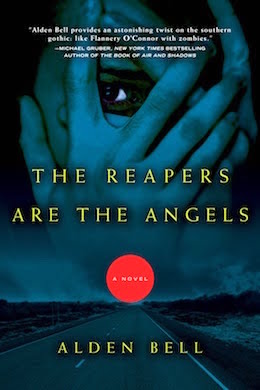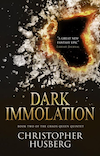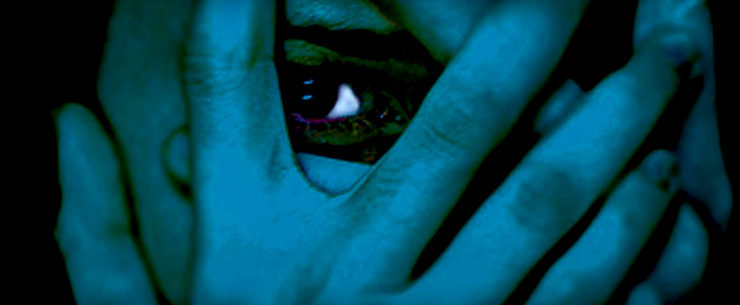Someone—I honestly don’t remember who—gave me some writing advice early on in my career, and it stemmed from a George Orwell quote: “Good prose should be transparent, like a window pane.” The idea behind this statement, as far as this advice went, was that prose should simply be the vehicle by which you convey character and story—it should be as unassuming and inconspicuous as possible in order to focus on what really matters.
Well, like just about every piece of advice in writing, I’ve come to trust that “rule” about as far as I can throw it (which, considering it’s a metaphysical concept, is not far?). There’s certainly truth to it, but I’ve found that at least for me, reality is fraught with nuance.
The idea of prose as a windowpane just seems restrictive to me. I like to think of prose more in terms of a good camera lens. I’m no photography expert, but I know a little bit about the topic, and there are, well, a lot of ways to adjust the settings on a photograph, from aperture and exposure to shutter speed, color, depth of field, and many, many more. All of these tools can help make a photograph look better, enhance certain aspects, subdue others, make it brighter, darker, and so forth.
I think prose can do the same thing for a story.
 One of my favorite novels of all time is Alden Bell’s The Reapers are the Angels. The story follows a young girl named Temple as she navigates a post-apocalyptic zombie wasteland, and I’m not exaggerating when I say not only is it the best zombie novel I’ve ever read, it’s a serious contender for the best novel period. It’s … pretty fantastic. Like most good zombie tales, the “slugs,” or “meatskins,” as they’re referred to in Reapers, take a back seat to far more frightening, and often far more human, monsters.
One of my favorite novels of all time is Alden Bell’s The Reapers are the Angels. The story follows a young girl named Temple as she navigates a post-apocalyptic zombie wasteland, and I’m not exaggerating when I say not only is it the best zombie novel I’ve ever read, it’s a serious contender for the best novel period. It’s … pretty fantastic. Like most good zombie tales, the “slugs,” or “meatskins,” as they’re referred to in Reapers, take a back seat to far more frightening, and often far more human, monsters.
But what really impressed me about Bell’s novel, and what really made me love it, was the prose. Let’s just look at the opening few paragraphs:
God is a slick god. Temple knows. She knows because of all the crackerjack miracles still to be seen on this ruined globe.
Like those fish all disco-lit in the shallows. That was something, a marvel with no compare that she’s been witness to. It was deep night when she saw it, but the moon was so bright it cast hard shadows everywhere on the island. So bright it was almost brighter than daytime because she could see things clearer, as if the sun were criminal to the truth, as if her eyes were eyes of night. She left the lighthouse and went down to the beach to look at the moon pure and straight, and she stood in the shallows and let her feet sink into the sand as the patter-waves tickled her ankles. And that’s when she saw it, a school of tiny fish, all darting around like marbles in a chalk circle, and they were all lit up electric, mostly silver but some gold and pink too. They came and danced around her ankles, and she could feel their little electric fish bodies, and it was like she was standing under the moon and in the moon at the same time. And that was something she hadn’t seen before. A decade and a half, thereabouts, roaming the planet earth, and she’d never seen that before. […]
See, God is a slick god. He makes it so you don’t miss out on nothing you’re suppose to witness first hand. (3-4)
Those paragraphs hooked me, and didn’t let go. The prose is anything but transparent here—in fact, the character’s voice is so intertwined with the prose that it’s almost impossible to separate the two. I’d argue that the prose in Reapers is so powerful and so present that it effectively becomes a manifestation of Temple herself. The prose in Reapers is a living, breathing thing, with its own cadence, slang, its own ticks and its own tricks.
Temple acknowledges the power of words, and I don’t think it’s by accident that it comes early in the novel: “…she knows that words have the power to make things true if they’re said right” (11). Prose does have that power, and it helps me to acknowledge that power as a storyteller. Sometimes I want my prose with #nofilter; I want it to be as clean and transparent as possible so I can get to the heart of whatever is at the story. Other times, however, I need heightened prose, with elaborate imagery and a strong, distinctive character voice, because it will enhance whatever is at the heart of the story. It’s like, I dunno, freaking cybernetic implants for my story. It may look a little strange, it may take some getting used to, but I’ll be damned if the enhancements they offer don’t outweigh their wonkiness.
Reapers is awesome because it’s a story about faith, love, and beauty, and it tackles all of those subjects in the most dreary, horrifying setting possible. But despite the mangled, tattered world in which she lives, Temple’s hope and positivity are conveyed most powerfully through the prose style itself. It’s just…it’s just beautiful, ya’ll. If you haven’t read this book, you need to. If you have read it, go read it again.
Framing and lenses matter. How we tell a story matters. And with The Reapers are the Angels, Alden Bell not only tells a story that matters, he tells it in a way that matters, too. Temple notes part way through the novel, as she and a companion come across a museum, how important beauty is in the world, and how subjective it is to the eye of the beholder: “This is art … these things have gotta last a million years so people in the future know about us. So they can look and see what we knew about beauty” (118).
As readers, we get to see what Temple knows about beauty through the apotheosis of the novel’s prose, as it becomes Temple herself. We also get to see hints of what Alden Bell knows about beauty, too, in how he crafts that prose and Temple’s character. I sincerely hope that The Reapers are the Angels lasts a million years into the future, so people can see this specific form of beauty.
 Christopher Husberg was born in Alaska and studied at Brigham Young University, where he went on to teach creative writing. His debut novel, Duskfall, was published in 2016, and was described as “Perfect for fans of Daniel Abraham and Brandon Sanderson” by Library Journal. His new novel, Dark Immolation, is available June 20th from Titan Books. He lives with his wife in Lehi, Utah.
Christopher Husberg was born in Alaska and studied at Brigham Young University, where he went on to teach creative writing. His debut novel, Duskfall, was published in 2016, and was described as “Perfect for fans of Daniel Abraham and Brandon Sanderson” by Library Journal. His new novel, Dark Immolation, is available June 20th from Titan Books. He lives with his wife in Lehi, Utah.










